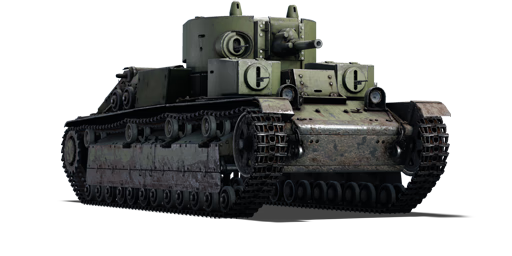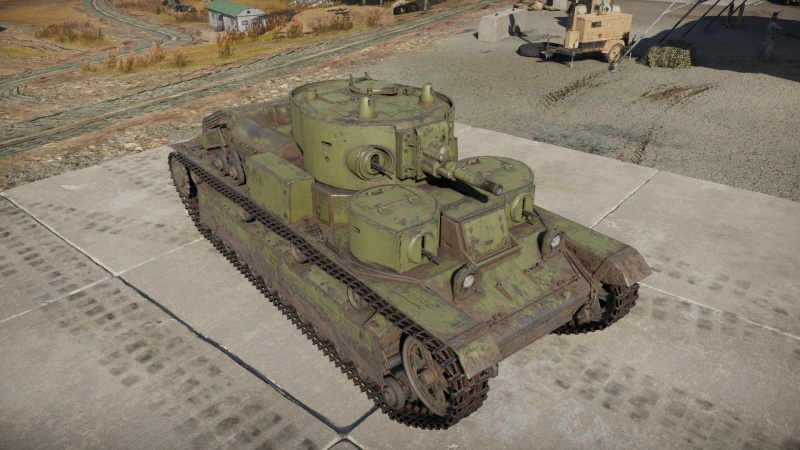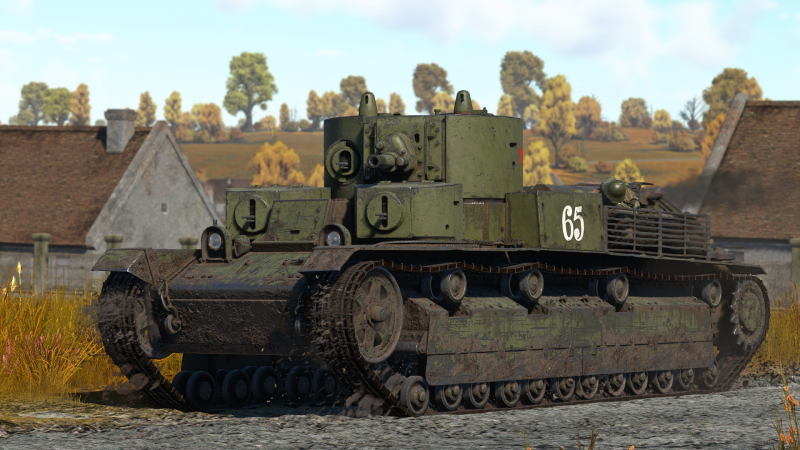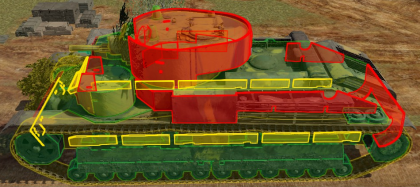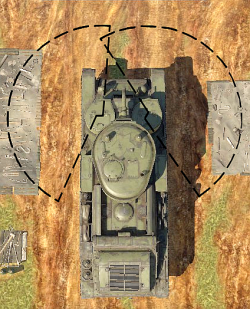T-28E
| This page is about the Soviet medium tank T-28E. For other versions, see T-28 (Family). |
Contents
Description
The T-28E is a rank Soviet medium tank with a battle rating of (AB), (RB), and (SB). It was introduced with Update 1.47 "Big Guns". It is similar to the original T-28 in all respect except the additional armour welded onto the front, side, and rear of the tank. The additional armour improves protection against enemy fire but slows down the vehicle due to increased weight.
General info
Survivability and armour
As with all other Soviet vehicles, the letter "E" behind the tank name means "ekranami" (which means "with screens" or "applique armour" in English). In this case, the T-28 received several 30 mm and 20 mm armour plates to enhance its protection. Whole main turret and machine gun turrets are reinforced by 30 mm plates, and Driver's viewport (a big weak spot) by 20 mm and 30 mm plates. Then there are several 20 mm and 30 mm armour plates installed on the sides and rear of the vehicle.
The extra armour on this tank is noticeable, especially when you angle your tank a bit, random poorly aimed shots will often be absorbed by extra layers of armour, or machine gun turrets, or will simply ricochet off. However, this is only true when you are playing as a "top vehicle" against weaker opponents. This tank has a slightly higher BR, and when the matchmaker puts you in a uptier, your armour will unfortunately not protect you anymore. Heavy tanks like the KV-1 (L-11) are completely immune to all your types of ammo, even from the rear.
Armour type:
- Rolled homogeneous armour (glacis, flanks and roof)
- Cast homogeneous armour (gun mantlet only)
| Armour | Front | Sides | Rear | Roof |
|---|---|---|---|---|
| Hull | 30 + 20 mm (20-22°) Driver's port 15 mm (65°) Front glacis 30 + 20 mm (23-25°) Lower glacis |
20 + 30 mm Top 20 + 10 mm Bottom |
15 mm (68°) Top 20 + 30 mm (6-37°) Bottom |
15 mm |
| Main Turret | 20 mm Turret front 20 mm (0-49°) Gun mantlet |
20 + 30 mm (0-23°) | 30 + 30 mm | 15 mm |
| Secondary Turrets | 22 + 30 mm | 20 + 15 mm | 20 + 15 mm | 10 mm |
Notes:
- Suspension wheels are 10 mm thick while tracks are 20 mm thick.
- Applique armour ranging from 20 to 30 mm in thickness cover the tank, but do not cover the entire surface area.
Mobility
| Game Mode | Max Speed (km/h) | Weight (tons) | Engine power (horsepower) | Power-to-weight ratio (hp/ton) | |||
|---|---|---|---|---|---|---|---|
| Forward | Reverse | Stock | Upgraded | Stock | Upgraded | ||
| Arcade | Expression error: Unexpected * operator. | 775 | Expression error: Unexpected round operator. | __.__ | |||
| Realistic | 442 | Expression error: Unexpected round operator. | __.__ | ||||
The additional armour adds about 4 tons to the weight, making it slightly slower than the original T-28. However, it is still fast and mobile.
Modifications and economy
It is recommended to prioritize the following modules:
- Parts - mandatory first modification, as you'll need to repair modules from the damages of enemy fire.
- BR-350A shell - mandatory second modification, as the stock shrapnel shell's performance is rather poor.
- FPE - to have the ability to put out fires.
- After those, prioritize upgrades that improve firepower and then anything else.
Armaments
Main armament
The 76 mm L-10 gun offers a reasonable penetration power at its battle rating. Its low muzzle velocity allows for a curved firing trajectory, ideal for firing at targets behind cover. However, it makes it hard to anticipate the path of moving targets. Because of the shortness of the gun, accuracy drop is noticeable from 700 m distance and a handicap over 1000 m. The rotation speed of the gun is decent compared to other tanks at the same rank or battle rating. The elevation angle is average. The depression angle is not big enough for you to fire from cover but it is better than no depression as it is a rare feature on Soviet vehicles. Your recoil is barely noticeable due to your short gun and the overall weight of the tank. The targeting procedure is quick together with a short reload time.
| 76 mm L-10 | Turret rotation speed (°/s) | Reloading rate (seconds) | |||||||||||
|---|---|---|---|---|---|---|---|---|---|---|---|---|---|
| Mode | Capacity | Vertical | Horizontal | Stabilizer | Stock | Upgraded | Full | Expert | Aced | Stock | Full | Expert | Aced |
| Arcade | 69 | -5°/+25° | ±180° | N/A | 14.3 | 19.8 | 24.0 | 26.5 | 28.2 | 6.50 | 5.75 | 5.30 | 5.00 |
| Realistic | 8.9 | 10.5 | 12.8 | 14.1 | 15.0 | ||||||||
Ammunition
The three available shells for the T-28 are very efficient for causing crew depletion. Each shell is suited for a specific type of opponent:
- Use the BR-350A (with MD-5 fuze) when facing enemy armoured targets (medium/heavy tanks). Its penetration power will force you to play at close or middle range (between 500 m and 1 km max) from your target. However, the post-penetration damage is very potent and will almost guarantee one-shot knockouts.
- The Sh-354T is most suited for lightly armoured targets (light tanks, armoured cars, planes) thanks to the increased spallation.
- The OF-350M is best to use against open-top vehicles (SPG with only a gun shield, platform trucks, SPAAs, etc.) because of the blast effect.
| Penetration statistics | |||||||
|---|---|---|---|---|---|---|---|
| Ammunition | Type of warhead |
Penetration @ 0° Angle of Attack (mm) | |||||
| 10 m | 100 m | 500 m | 1,000 m | 1,500 m | 2,000 m | ||
| Sh-354T | Shrapnel | 31 | 30 | 26 | 22 | 19 | 16 |
| BR-350A (MD-5 fuze) | APHEBC | 67 | 66 | 60 | 54 | 48 | 43 |
| OF-350M | HE | 10 | 10 | 10 | 10 | 10 | 10 |
| Shell details | ||||||||||||
|---|---|---|---|---|---|---|---|---|---|---|---|---|
| Ammunition | Type of warhead |
Velocity (m/s) |
Projectile mass (kg) |
Fuse delay (m) |
Fuse sensitivity (mm) |
Explosive mass (TNT equivalent) (g) |
Ricochet | |||||
| 0% | 50% | 100% | ||||||||||
| Sh-354T | Shrapnel | 560 | 6.44 | 1.2 | 14 | 85 | 62° | 69° | 73° | |||
| BR-350A (MD-5 fuze) | APHEBC | 555 | 6.3 | 1.2 | 14 | 150 | 48° | 63° | 71° | |||
| OF-350M | HE | 560 | 6.2 | 0.05 | 0.1 | 621 | 79° | 80° | 81° | |||
Ammo racks
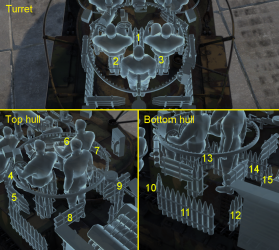
| Full ammo |
1st rack empty |
2nd rack empty |
3rd rack empty |
4th rack empty |
5th rack empty |
6th rack empty |
7th rack empty |
8th rack empty |
|---|---|---|---|---|---|---|---|---|
| 69 | 62 (+7) | 56 (+13) | 50 (+19) | 47 (+22) | 44 (+25) | 41 (+28) | 39 (+30) | 36 (+33) |
| 9th rack empty |
10th rack empty |
11th rack empty |
12th rack empty |
13th rack empty |
14th rack empty |
15th rack empty |
Visual discrepancy |
|
| 33 (+36) | 30 (+39) | 20 (+49) | 17 (+52) | 14 (+55) | 4 (+65) | 1 (+68) | No |
Notes:
- Shells are modeled individually and disappear after having been shot or loaded.
- If you pack 50 (+19) shells, it will keep the turret empty of ammo.
- If you pack 33 (+36) shells, it will keep the turret and the top hull empty of ammo.
Machine guns
| 7.62 mm DT | ||||
|---|---|---|---|---|
| Mount | Capacity (Belt) | Fire rate | Vertical | Horizontal |
| Coaxial | 2,646 (63) | 600 | ±15° | ±15° |
| Left turret | 2,646 (63) | 600 | -5°/+28° | -155°/+5° |
| Right turret | 2,646 (63) | 600 | -5°/+28° | -33°/+145° |
Usage in battles
The powerful, yet accurate gun, paired with large profile make the T-28 look ideal for long-range encounters, yet its low penetration, slow shell muzzle velocity and the absence of gun depression to cover yourself behind terrain quite discourage this kind of gameplay style. But the crew/equipment spacing, its high versatility and powerful main gun make this tank quite capable in close range encounters. Hit and run tactics work pretty well (if the "run" aspect of it is ever needed).
If you ever find yourself against well-protected medium or heavy tanks, it is often better to stay and try to fight, as the large profile of your tank makes you easy to be hit while retreating. Always aim for weak points like the driver's hatch or gunner's port. If you find yourself unable to ensure an accurate shot against such a small target, attempt to cripple the tank's offensive armament first to take some pressure off.
- Offensive role
The T-28E, like the T-28, should be played as a support tank, taking advantage of its APHEBC shell, good mobility, high crew count and complex frontal glacis shape. By playing as a support/second line tank, you will help kill enemy tanks and thus turn the tide of engagements on the frontline. Once the enemy is destroyed, your good mobility allows you to move forward together with frontline tanks and help capturing objectives. Stay close to the frontline to maximize penetration power and support spearheading tanks with it, all while staying away from the frontline to avoid being flanked or swarmed. When engaging enemy tanks, angle your tank to cover your driver's hatch and your turret flanks. Use your MG turrets and your lower glacis to absorb incoming fire. Inexperienced players will most likely waste shots on your complex frontal armour shape. With the BR-350A shell, the T-28E easily can take on most opponents.
- Defensive role
In the event the spearhead tanks of your team get crushed by the enemy, you will then play a defensive role by containing enemy breakthrough attempts. It will fall upon you to stop enemy tanks dead in their tracks. Being at a distance from the frontline will force enemy tanks to drive in the open to get to you. Always play with a nearby obstacle you can use as cover if you get hit and need to repair. Have a planned escape plan as the enemy will try to use artillery or CAS to dislodge you from cover and your big silhouette will increase your chance of being hit by artillery strikes. A good player in a T-28E can lock a side of the battlefield, especially in corridor maps.
- Other roles
If you try to use the T-28E in a different role on the battlefield, you will quickly reach its limits:
- If you try to play the T-28E as a frontline tank, you will take shots from long range tank destroyers that will disable your tank: your armour has a complex shape but is not very thick, even with the applique armour. You will also be easily flanked by light tanks or armoured cars, especially if they swarm you. Your reverse speed is too poor to get you out of hot spots quickly enough. Only 1-on-1 engagements should be performed in this role.
- If you attempt to play long range engagements, your short gun will lack accuracy and penetration will greatly drop over distance, while your big silhouette will make you a target of choice for enemy counterfire. The absence of gun depression will prevent you from firing behind the cover of a ridge while the slow muzzle velocity will make it difficult to aim at moving targets in the distance.
- Notable enemies
- Long range tank destroyers: ZiS-30, Marder III, LVT(A)(4)(ZiS-2), SU-76M.
- Frontline tanks: T-50, Pz.III J, Sd.Kfz. 234/2.
- Tanks with HEAT shells: Pz. IV E/F1, StuG III A, SU-122, Italian 75 mm tank destroyers.
- Defeating a T-28E
The T-28E received additional armour shields in comparison to the T-28 but weak spots remain:
- In a frontal encounter, the driver's hatch (between the MG turrets) or below the gun mantlet are the easiest to target.
- When flanking, aim for the flanks right under the center of the main turret or the rear side of the turret ring (small area).
In case of a frontal attack, try blinding the T-28E with smoke and then swarm it with several fast tanks to saturate its defensive capacities. If you are alone, flanking a T-28E undetected remains your best chance to destroy it.
Pros and cons
Pros:
- Fast and versatile for such a big medium tank
- The cannon does a lot of damage and is quite accurate
- BR 350A shell will instantly destroy most tanks around this tank's battle rating, even the M3 Lee frontally
- Crew of 6 - "extra" machine gunners can replace other knocked-out crew members and keep the tank performance at its full potential
- Machine gun turrets and complicated multiplayer side armour often simply "absorb" projectiles
- Armour is good when playing as a "top tank"
- It has the Shrapnel as standard ammunition, which is very effective against light tanks and SPAAs
- Total of 3 machine guns can make short work of any open AA vehicles
Cons:
- Large silhouette
- Slow reloading
- Unreliable armour - a lot of small weak spots and strong areas very close to each other
- Though not necessarily slower, it takes a slightly longer time to accelerate than the original T-28
- Poor gun depression
- Very low penetration on standard ammo, making the initial grind quite painful, AP ammo penetration isn't very good either
History
Development
Prerequisites set up in 1929 called for infantry support and breakthrough tank that are able to exploit breakthroughs and handle infantry fortifications. The development of this tank under Chief engineer S.Ginsburg may have been inspired by the British Vickers A1E1 Independent tank as the final design took some elements of it. The end result was a multi-turreted medium tank with a 76.2 mm L-10 main gun and two 7.62 mm machine gun turrets in front. The design was satisfactory that Stalin himself ordered a heavier variant of the tank that can suit the breakthrough role, which would be the T-35. The first multi-turreted was designated the T-28 and was considered revolutionary for the time as it was the first medium tank of its kind and would establish the concept of such tanks. The first prototype of the T-28 was created sometime in 1931, its design was considered revolutionary for the time as it was one of the first medium tanks in the world. Production of this tank began in the Kirov Factory in Leningrad sometime in 1932, and it was accepted into service on August 11, 1933. Though in service for eight years from 1933 to 1941, only 503 units were produced.
Design
The T-28 was relatively slow for its weight, but as an infantry tank, this disadvantage was mitigated by its role and its heavier armour. The front two turrets with machine guns are installed in front of the main turret, which was considerably higher. The main turret was a shared feature from the T-35 in order to standardize parts in production. The tank was initially to be armed with a 45 mm gun like the BT and T-26 light tanks, but the larger 76.2 mm howitzer was chosen instead for added explosive power. The turret had a turret basket and a rear-facing machine gun. A later upgrade had a commander's cupola added onto the turret plus the capability to mount another machine gun on top for anti-aircraft purposes. The tank had a crew of six (driver, two machine gunners, loader, gunner, commander) and ran on a V12 M17 air-cooled engine that can deliver 500 horsepower. Though providing enough power to propel the T-28 at a speed of about 37 km/h (22 mph), the gasoline fuel it used was flammable and rare in Soviet usage. The armour on the tank was 30 mm maximum on the front and side glacis, which was sufficient enough to stop most anti-tank armament at the time. The suspension on the tank was a bogie system with plunger springs and usually has a 20 mm thick side skirt protecting the sides. Transmission and engine compartment is at the very rear under a canopy for easy access. At its introduction in 1933, the T-28 was one of the most effective tanks in the world and had a few innovations. Other countries only had WWI-era Renaults and the Germans had no tanks of their own at its development. The T-28 was also the first to have radios and anti-aircraft gun mounts.
Combat usage
The standard organization of the T-28 tanks in 1939 was 136 T-28s and 47 BT-7 in one heavy armoured brigade. The T-28s were first deployed on the eastern borders during the border clashes with Japan in 1939. The first large scale action was in September 1939 when the Soviet Union invades Poland with its front line fleet of T-28s. Though the Polish tanks and anti-tank guns were able to take out a few T-28s, it is not known how many were lost. The next conflict the T-28 served in was the Winter War against Finland. These tanks were used against Finnish fortifications, but the conflict also showed the inadequate armour on the T-28, where Finnish anti-tank guns were able to reliably penetrate the tanks. Though over 200 T-28s were knocked out in the conflict, only 20 were totally lost due to the system of armour recovery and repairs the Soviet had and the conflict's close proximity to the Kirov Factory, some tanks were repaired more than five times and sent back to the front. The Finnish were able to capture seven of these (two in the Winter War, 5 in Continuation War)and used them against their users. The Finnish came about to nicknaming them Postivaunu ("mail coach") after an incident where a T-28 commander was captured carrying the salary and mail for the 91st Tank Battalion and Kivitalo ("stone building") for its large size. The heavy weight of the tank caused the Finnish to be unable to tow some of the knocked out T-28s for capture, so those unable to be recovered were stripped of their equipment.
After Finland, the T-28's inadequate armour was showcased to the Soviets and an attempt at up-armouring the design was made in 1940 with the welding of additional armour plating to increase the 30 mm armour to 80 mm of armour in thickness. This increase in armour made the tank now weigh 32 tons. This up armouring of the tank was designated the T-28E.
During the German invasion in Operation Barbarossa in mid-1941, the Soviets had about 411 T-28s in their inventory. Many were lost not due to battle, but actually from mechanical breakdowns due to lack of spare parts and low maintenance, causing them to be abandoned by the crew. The Germans were able to capture at least two of these tanks and may have used these against the Soviets as the T-28 746(r). The T-28s that were not lost during the first few months of Operation Barbarossa took part in winter defence of Leningrad and Moscow. Though still in inventory, by 1942 they were rare in Soviet service and declared obsolete as better tanks like the T-34 was taking over its role and is more heavily gunned, more armoured, and faster. The tanks still in one piece were dismantled for spare parts or sent to training facilities.
| Archive of the in-game description | |
|---|---|
|
A version of the T-28 multi-turret medium tank with additional armour plating on the turret and body. Its enhanced armour was based on the experience of the Soviet-Finnish War and also had the goal of adapting outmoded tanks to meet modern conditions. | |
Media
- Skins
See also
- Other vehicles of similar configuration or role
External links
| Leningrad Kirov Plant (Ленинградский Кировский Завод) | |
|---|---|
| Medium Tanks | |
| T-28 | T-28 (1938) · T-28 · T-28E |
| T-80 | T-80B · T-80U · T-80UK · T-80BVM |
| Heavy Tanks | |
| KV-1 | KV-1 (L-11) · KV-1 (ZiS-5) · KV-1E · KV-1S |
| KV-2 | KV-2 (1939) · KV-2 (1940) · KV-2 (ZiS-6) |
| Other | SMK · KV-220 · IS-7 · Object 279 |
| Captured | |
| KV | ▀KV-IB · ▀KW I C 756 (r) · ▀KW II 754 (r) |
| Other | T-28 (Sweden) |
| Export | T-80U (Sweden) |
| See Also | Chelyabinsk Tractor Plant |
| USSR medium tanks | |
|---|---|
| T-28 | T-28 (1938) · T-28 · T-28E |
| T-34-76 | T-34 (Prototype) · T-34 (1940) · T-34 (1941) · T-34 (1st Gv.T.Br.) · T-34 (1942) · T-34E STZ · T-34E |
| T-34-57 | T-34-57 · T-34-57 (1943) |
| T-34-85 | T-34-85 (D-5T) · T-34-85 · T-34-85E |
| T-34-100 | T-34-100 |
| T-44 | T-44 · T-44-100 · T-44-122 |
| T-54 | T-54 (1947) · T-54 (1949) · T-54 (1951) |
| T-55 | TO-55 · T-55A · T-55AM-1 · T-55AMD-1 |
| T-62 | T-62 · T-62M-1 |
| T-64 | Object 435 · T-64A (1971) · T-64B |
| T-72 | T-72A · T-72AV (TURMS-T) · T-72B · T-72B (1989) · T-72B3 · T-72M2 Moderna |
| T-80 | T-80B · T-80U · T-80UD · T-80UK · T-80UM2 · Т-80U-Е1 · T-80BVM · Object 292 |
| T-90 | Т-90А · T-90M |
| Trophies/Lend-Lease | |
| Germany | ▂T-III · ▂T-V |
| Great Britain | ▂МК-IX "Valentine" |
| USA | ▂M3 Medium · ▂M4A2 |


